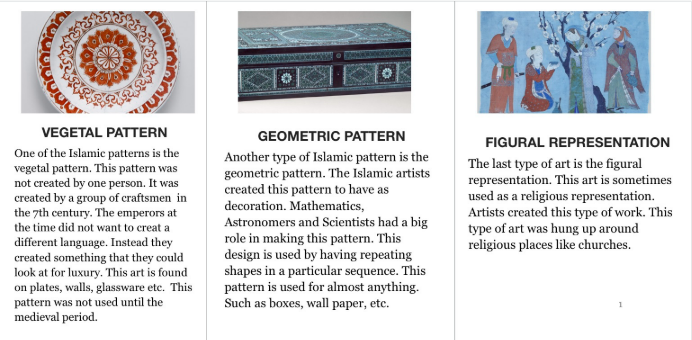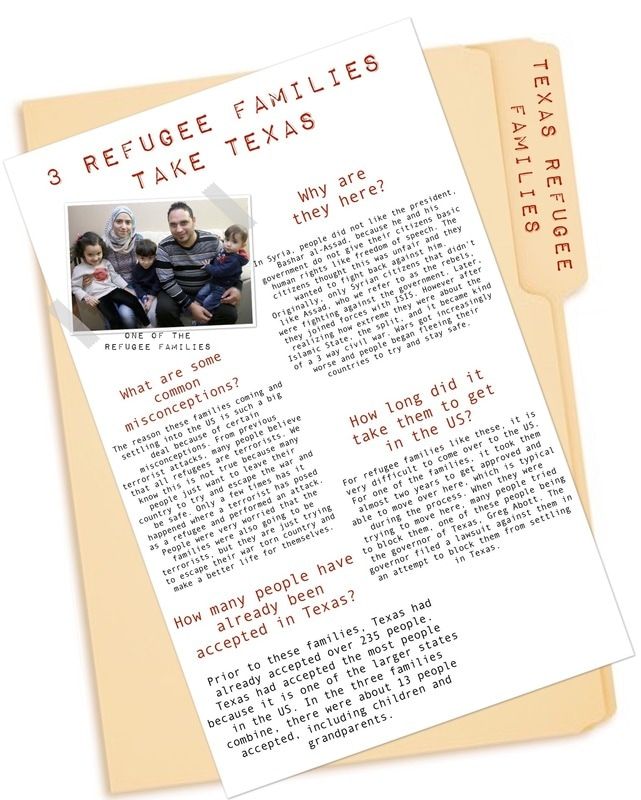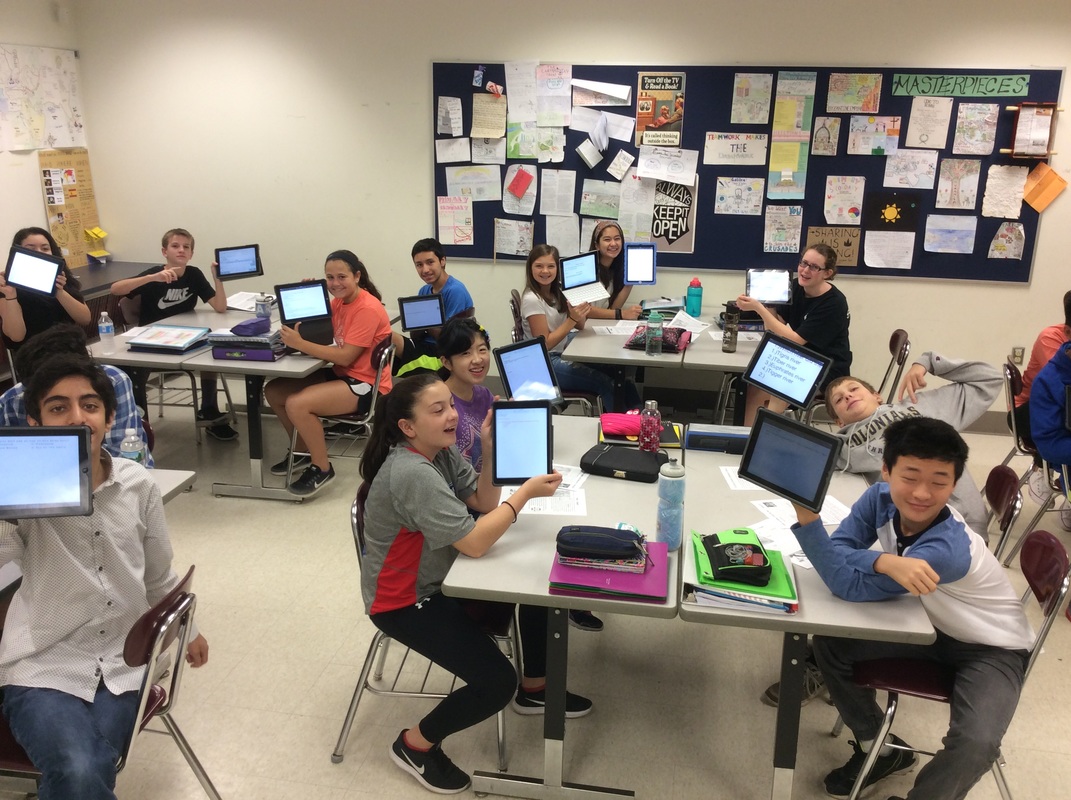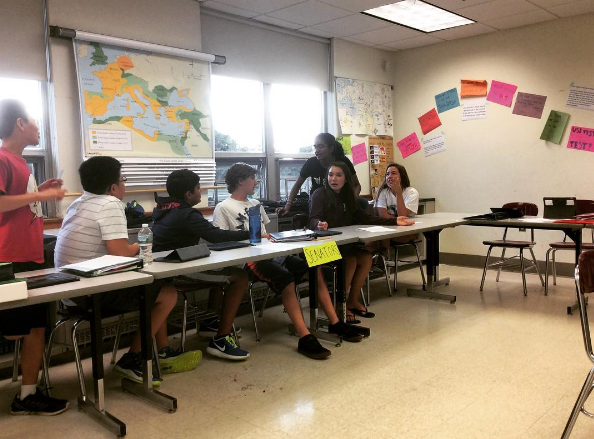|
For the majority of winter, students are (appropriately) in the Dark Ages...a time of transition between the 'light' of the Roman Empire and the Renaissance. During this time a variety of topics are covered both in the Islamic Empire (past unit) and in Western Europe (current unit). Students are currently studying the Vikings and their interactions with France and England.
Ask your son or daughter which Viking king united Scandinavia - their answer will probably be very familiar to you! Students have finally finished up their articles on both the history and legacies of the Islamic Empire as well as current events regarding the Middle East and Muslims in the US today. I was very impressed not only with their independence in their planning, but the variety of topics that students chose to cover, the creativity and professionalism in the visual presentation, and their willingness to help one another with peer feedback. A couple of student examples are below.
0 Comments
Students are currently working on the first standard for trimester two: "describes major developments and achievements of Islamic history." This year, the eighth grade Social Studies department is working on integrating more current events into this unit and how some of the issues today in the Middle East are tied to the history of the Islamic Empire. 8 Blue students have been examining current conflicts in the Middle East today and connecting them to the rise and development of the Islamic Empire in the early 700s CE.
By doing this, students have been learning about the history and development of the Islamic Empire while also addressing misconceptions about the history behind Islam in today's world. Working more current events into the curriculum has had a great effect on classroom discussion, as the students have been very active in asking questions and sharing relevant stories they have seen in the news. Along with our day to day classwork, students have been individually researching a topic of their choice to include in an 8 Blue Magazine that we will be putting together after the break. Their topics range from the study of algebra and the concept of zero, to calligraphy, to the history of Islamic architecture in the 8th century! Please ask your son or daughter about the topic they have chosen to work on - their enthusiasm and curiosity has been overwhelming. More info to come on the magazines as their research continues to take shape! As always, please email me if you have any questions or concerns. In Social Studies, students have finally wrapped up the Roman Empire - bidding goodbye to the Romans by writing odes to their civilization and why it fell. Ask your son or daughter to share their ode with you!
Right now, students are working on the Byzantine Empire, with an assessment next Monday, November 21. If your child will be absent next week, please encourage them to let me know so we can make arrangements. Students are currently looking at Justinian's Code, the set of laws enacted by Emperor Justinian in the early 500s CE. Students are looking at parallels between what Justinian and his lawmakers wrote and what our Founding Fathers included in the Declaration of Independence. Over the next couple of days, we will be discussing what makes a good leader and why Justinian might not necessarily have been the best leader despite his impressive legacy. As the Thanksgiving (short) break draws near, it is important that students continue to stay on top of their homework and test preparation. As always, if you have any questions or concerns, please feel free to email me at [email protected] Our first Social Studies test is Tuesday, October 25. This test will be on the Rise of Rome, and includes Rome's origins, location, the early Republic, Julius Caesar, and the achievements of the Roman Empire. Students received their study guide yesterday (10/17) and are required to complete and submit it by next Monday, October 24. Each day this week, we will be doing some review.
Today, students are making their own trivia & test questions using the notes from the beginning of the unit - the photo below is E block as they get started on their trivia questions. Ask your son or daughter what they thought was the most interesting thing they learned about in Rome - sometimes their answers even surprise me :) On Friday, 8 Blue students took on the role of Senators, Magistrates, and Assemblies to solve the issues of the Roman Republic. Consuls determined whether or not to send legions to the border to fight invading Gauls, Praetors and senators argued over money for new bath houses, and tribunes vetoed senate ideas that would not benefit the citizens of Rome. Ask your son or daughter about the difficulties of a three branch system with checks and balances - they definitely had strong opinions in class!
This year in Social Studies, students are exploring the past by asking 'big picture' questions about how historical events are tied together and impact one another. Right now, students are exploring the different tools that historians use to learn about the past, with some upcoming student favorites being primary & secondary sources and the Domino Effect. Ask your son or daughter about how students in the future may someday view our time here in 2016 when it becomes history itself! Soon we will be starting to talk about Ancient Rome and how it set the stage for all of European, North African, Middle Eastern, and even American history over 2,000 years ago. The course expectations with an overview of what we will be studying all year are below - please do not hesitate to email me with questions!
|
The 8 Blue TEamMs. Amaral - Social Studies Archives
August 2019
Categories |
||||||




 RSS Feed
RSS Feed
